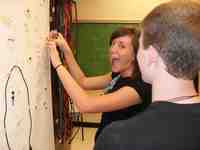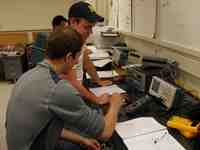
|
Syllabus |

|
| 33-228 | Electronics I | Spring 2020 |
| Instructors: | Prof. Jeffrey Peterson | Prof. Ben Hunt | Prof. Simran Singh |
| Wean Hall 8414 | Wean Hall 6412 | Wean Hall 6402 | |
| Phone: 412-268-2745 | Phone: 412-268-9918 | Phone: 412-268-4473 | |
| E-mail: jbp at andrew.cmu.edu | E-mail: bmhunt at andrew.cmu.edu | E-mail: simranjs at andrew.cmu.edu |
| Text: | Basic Electronics: An Introduction to Electronics for Science Students---Second Edition by Curtis A. Meyer | |
| Lab Manual: | [[ NOTE: In Spring 2020, the Lab Manual is undergoing significant changes because of a major lab equipment upgrade. The individual lab instructions will be available on Canvas. ]] | |
| The textbook is available from lulu.com |
Goals and motivations:
This course introduces you to electric circuit components, design, applications, and construction. We also cover the analysis techniques relevant to the linear systems (i.e., linear circuits) you will build in the lab. While you may have seen material on electrical conduction, capacitors, inductors, and associated circuit analysis, we will take a practical view of applying this knowledge and expanding it to include a broader variety of circuit components including transistors, and analog and digital integrated circuits.
In the laboratory, the emphasis will be on developing your ability to construct and understand various types of electronic circuitry. You are expected to develop skills of observation and measurement, while learning the more prosaic skill of making an electronic circuit work. We will combine circuit-theoretical analysis with a more intuitive approached based on knowledge of device properties; both of these approaches are necessary for a working knowledge of electronics.
A working knowledge of electronics is necessary for almost any type of laboratory work. While many instruments are available off-the-shelf, an understanding of how such instruments work is a prerequisite to intelligent (and accurate) use. Furthermore, interfacing an experiment to an instrument frequently requires the design of an interface circuit to adjust signal levels, impedances and such. To interface a measurement to a computer usually requires the conversion of analog signals to a digital form, and the analog signal needs to be properly conditioned. Finally, there are many occasions when the right instrument simply is not available off-the-shelf. A primary goal of the course is for you to become sufficiently comfortable with basic electronics to be able to move into advanced topics on your own and to apply what you know to real-world situations.
Finally, if you understand electrical circuit theory, you have an analog
or analogy for many systems in the physical world. Conversely, when you
study physical mechanics, condensed matter physics, Fourier series, and
many other topics, you will have seen a system which exhibits many analogous
properties. This analogy emerges from the fact that linear electronic circuits
can be described by a second-order linear differential equation much like
the form of Newton's second law -- you just have to re-interpret the symbols!
Outcomes:
After successful completion of this course you will have an understanding of circuits and circuit components and be able to design, build and test simple analog and digital circuits. You will also be able, with the help of a more advanced electronics text such as The Art of Electronics, to design and build simple circuits for use in research.
Your success in achieving these outcomes will be measured by your observed laboratory skills, and in particular the graded lab books that you keep to describe your work. Open lab-book quizzes will be used to assess your basic understanding of the course material.
Procedures:
There will be two lecture classes per week (Tuesday and Thursday from 9:30 - 10:20 in Doherty A200). Here, we will discuss materials pertinent to the following week's laboratory work and introduce the more formal aspects of circuit theory. Occasional pop quizzes may be given (in addition to the open lab-book quizzes), in part to give you feedback on your ability to use the theory.
There are two lab sections, one on Mondays and Wednesdays (Sec A) (1:30 - 4:20, Doherty Hall A324), the other on Tuesdays and Thursdays (Sec B) (same time and place). We will, as necessary, take time at the beginning of lab periods to introduce new material and/or discuss details of procedure.
You will be given bound laboratory notebooks in lab, and your CMU account will be charged a small fee. (Bound means that to remove a page, you need to tear it out). When you complete a lab, you will turn in the notebook containing all the work for that lab. Bring the relevant notebook to each lab period to record all information, circuit diagrams and data. Your notebook should be sufficiently detailed that you or another person could use only the notebook to repeat your work (Note: it is not uncommon to find that you doubt your own measurements when you look back at them -- and it is amazing how fast the small details of how you did something can leak out of the brain; hence, a good notebook is essential. Furthermore, out there in the cold, cruel world, someone else may doubt your work and want to check it -- to have your work accepted, it must be repeatable and to be repeatable, one has to know what to repeat!). In the laboratory, you will typically share the work with one lab partner, but you should be sure to understand all details of what the two of you are doing and why. Your instructors will give feedback on the notebooks during lab periods. The notebooks will not be graded on neatness per se (but legibility is a must), but will be treated as an additional means of evaluating your effort and understanding of laboratory procedures and your laboratory skills.
Homework assignments will allow you to develop a quantitative ability with circuit theory and will expose you to circuits which we do not have time to build and test in the lab.
Grading:
For details on grading, please see the Grading web page. It gives the breakdowns on letter grades.
Lab Quizzes:
There will be open lab-book in-class quizzes at the time your labs are due. For details on when these will be held, consult the Activities page.
Policies on class and lab work:
Obviously, collaborative work is allowed and encouraged in the lab. Discussing procedures, from how to take data most efficiently to why the circuit works the way it does, is a significant part of gaining a complete understanding.
On homework assignments, it is permissible to discuss problems with other students (and with the instructors), but the work you hand in should be your own. This also applies to the writing of lab reports. Your lab book MUST NOT be a carbon copy of your lab partner's.
Lab books must be . The goal of your lab book is to convey information. If you cannot read your own book, then no one else will be able to read it. The instructors reserve the right to reject extremely sloppy and/or illegible work. Just take a little extra time to write clearly, with sufficiently large characters, and your lab books should be fine.
Clearly, all work on the quizzes must be done independently.
Late work: Occasionally, the instructors may grant an extension on a homework or a lab book with a suitable excuse. This must, however, be discussed with an instructor at least 24 hours before the due date and time (5:00 pm) or no extension without penalty will be granted. The penalties will be -10\% for the first day, -10\% for the second day, and -5\% per day thereafter. For lab quizzes, make-up quizzes will generally not be granted unless under exceptional circumstances, but we do drop one of the nine scores for your final grade, and there will be opportunities to make up lost points on quizzes (to be discussed after the first quiz).Additional policies:
Academic integrity. CMU students are expected to comply with the ethical guidelines and cheating and plagiarism policies defined in The Word. Please read it carefully! Cheating and plagiarism are defined in the are defined in the CMU Student Handbook, and include (1) submitting work that is not your own for papers, assignments, or exams; (2) copying ideas, words, or graphics from a published or unpublished source without appropriate citation; (3) submitting or using falsified data; and (4) submitting the same work for credit in two courses without prior consent of both instructors. Any student found cheating on or plagiarizing any work for this course will receive no credit for that work. Further action will also be taken, if deemed necessary.
Homework problem sets may be worked on collaboratively, but each student must turn in a unique submission. If you do work on a homework with your peers, you should acknowledge them in writing, as in ``I worked with [so-and-so] and [so-and-so] on this problem set.'' Use of technology in the classroom. No cell phones, please: it is a small class, and if you are texting or instagramming or tiktokking, it is bound to be a distraction to the instructor and to your classmates (not to mention to you as well). I will take note if I see cell phone usage in class, and this will likely influence your participation grade. If you feel you must take notes using your laptop, please sit in the back row - again, so you do not distract your classmates. Recording. No student may record on video any classroom activity without the express written consent of the instructor. Snapping photos of the whiteboards is ok, and please point out if you catch any mistakes I make! Accommodations for students with disabilities. CMU is committed to providing reasonable accommodations for all persons with disabilities. Please contact me privately (and preferably early in the semester) to discuss your specific needs. Please also contact Disability Resources at access@andrew.cmu.edu or 412-268-2013 to register and acquire documentation about your needs.
Contact us!
We want you to enjoy this class and get a lot out of it, so if you have any questions, concerns, or suggestions, please get in touch with us. Email is best. We probably won't answer emails between 11 pm and 7 am or so (since we will be asleep) but we will do our best to answer you as soon as we can.
Web site:
The course web site is located at http://www-meg.phys.cmu.edu/physics_33228/. A detailed schedule of the course activities are available here. This includes all homework assignments, lab quiz dates, and lab notebook due dates.